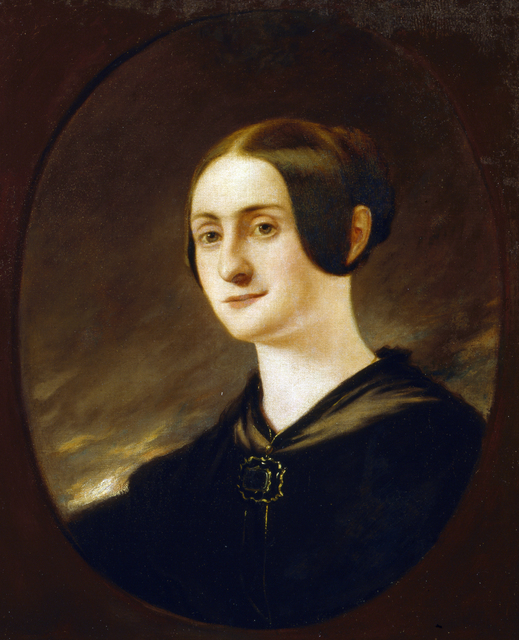 This will be the final post on my blog this year for the College of Charleston class, Beyond the Grave. Please enjoy my final project, the history of a famous "old Charlestonian," details of which you can find on the class blog. My last post this semester is dedicated to the queen of Charleston, Penina Moise; the poet Charleston forgot.
This will be the final post on my blog this year for the College of Charleston class, Beyond the Grave. Please enjoy my final project, the history of a famous "old Charlestonian," details of which you can find on the class blog. My last post this semester is dedicated to the queen of Charleston, Penina Moise; the poet Charleston forgot.Penina Moise is best known for her beautiful and witful poetry that was quite famous during the mid 1800's. The reason that I am currently undertaking this project on her is actually because she became famous right here in Charleston, in the very synagogue I did another project on earlier this semester. Before she was the very first Jewish woman to be published in the United States, she was a caring Sunday school teacher at Kahal Kadosh Beth Elohim (KKBE), the oldest remaining Jewish Synagogue in the U.S., and when she passed, was interned within the walls of Coming Street Cemetery.

Born on the 23 of April, 1797, and passing on the 13 of September, 1880, Penina lived to the age of 83, and it has been said about her that she did what she loved until the day she died; telling stories and teaching her people. As far as I can tell, that is absolutely what she did.
She was born to Abraham and Sarah Moise along with eight siblings. Her mother was known to be ill early on from Penina's childhood, and when her father passed, Penina joined the workforce at age 12 to assist her family as a nurse. Despite her full workload, she continued her studies on the side and joined the ranks of writers in 1830, and at 1845 became the Superintendent of Education at the very Synagogue she grew up in, KKBE.
 During the Civil War she was forced to move from her home in Charleston with one of her sisters, and during this sojourn, her lifelong nearsightedness worsened to blindness. Upon returning to the great city, she, her sister and niece joined together to open an academy. During this time, however, she struggled with poverty, although was said to accept her position with humility and ever-present grace. Several years later, she passed away following her sister's death. Her body lays at Coming Street Cemetery, marked with a granite die-on-socket and a small copper plaque commemorating her memorable and extraordinary life, the words of which are especially poignant.
During the Civil War she was forced to move from her home in Charleston with one of her sisters, and during this sojourn, her lifelong nearsightedness worsened to blindness. Upon returning to the great city, she, her sister and niece joined together to open an academy. During this time, however, she struggled with poverty, although was said to accept her position with humility and ever-present grace. Several years later, she passed away following her sister's death. Her body lays at Coming Street Cemetery, marked with a granite die-on-socket and a small copper plaque commemorating her memorable and extraordinary life, the words of which are especially poignant. Her death certainly did nothing to get rid of her infamous spirit, which lived on in the memories she left behind in the poems and hymns she created throughout her life. One of her most infamous works was a volume of secular poetry entitled Fancy's Sketch Book, which earned her a place in history as the first published Jewish woman of the U.S. It encapsulated her wealth of knowledge on then-modern day topics such as Jewish reform, Greek mythology, moral issues, and the Bible, among others. Along with works like this one, were many popular columns in widespread newspapers and journals of her day. My personal favorite of her work, she also created an entire hymnal for Kahal Kadosh Beth Elohim, which is still popular in hundreds of modern synagogues, over 150 years after their publish date.
Her death certainly did nothing to get rid of her infamous spirit, which lived on in the memories she left behind in the poems and hymns she created throughout her life. One of her most infamous works was a volume of secular poetry entitled Fancy's Sketch Book, which earned her a place in history as the first published Jewish woman of the U.S. It encapsulated her wealth of knowledge on then-modern day topics such as Jewish reform, Greek mythology, moral issues, and the Bible, among others. Along with works like this one, were many popular columns in widespread newspapers and journals of her day. My personal favorite of her work, she also created an entire hymnal for Kahal Kadosh Beth Elohim, which is still popular in hundreds of modern synagogues, over 150 years after their publish date. Up until the date of her death, she scrawled hundreds of poems known for their witful play on words and sincere take on life, that have been largely forgotten by the majority of the population, but should be remembered as the beautiful and prominent work of life that they were. As she was described by the author of her biography, Charlotte Adam's, Penina was and is an "incarnation of intellectual and social splendor -- a queen of Charleston literary society."
Check these out for more information on the queen, look into my resources here:
Her Gravesite
Jewish Archive
Jewish Virtual Library
South Carolina History
Modern Jewish Telegraphic Agency
United States History



No comments:
Post a Comment